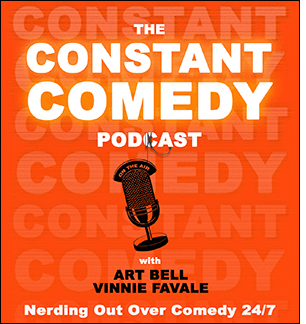|
|

|
|
Constant Comedy Once upon a time in 1989, when cable was new and networks were few, media executives Art Bell and Vinnie Favale started the Comedy Channel, which later became the famous Comedy Central. It all began thanks to the great determination and perseverance of Art Bell, who first pitched the idea to a less than enthusiastic HBO. When they finally said yes, an energetic Vinnie Favale came aboard, and with a team of cable network execs they launched the Comedy Channel on November 15, 1989. After merging with MTV's competing comedy network, HA! in 1991, it was renamed Comedy Central and has become a much-loved and long-lasting source of laughs for the world.
In honor of the 30th anniversary of the network's debut, the Constant Comedy Podcast will take you behind the scenes of those early days, delving deeper into the stories from the book. It will also explore comedy with the people who make it happen - writers, producers, and actors. Its debut season consists of 12 60-minute episodes which will air every week on Itunes or Spotify. Guests include comedian and actor Jonathan Katz (Dr. Katz, Professional Therapist), comedy writer Nick Bakay (voice of Salem the cat in Sabrina the Teenage Witch), five-time Emmy Award-winning writer, director, and producer Bill Persky (The Dick Van Dyke Show, That Girl), producer Laurie Zaks (president of television at Mandeville Films and creator/producer of Castle), producer Scott Carter (Politically Incorrect, Real Time with Bill Maher), and writer-producer Betsy Borns (Friends, Roseanne, All of Us).  Lese Dunton: Is doing a podcast fun? Lese Dunton: Is doing a podcast fun?
Art Bell: It's more fun than I thought it would be. Actually, I love talking to people and hearing their stories almost as much as I love talking about my story! It's been surprising how gratifying it is to talk with them. They were there at the beginning, with Vinnie and me, and they have stories we hadn't heard. On top of that, these people that we're talking to for this podcast have become really successful in the entertainment business. We were talking with somebody the other day who was the head of Paramount Pictures and she started at the Comedy Channel. So that was her first television job. It's just amazing what people have done. It's amazing what Vinnie has done. Vinnie Favale: The fun part for me is reconnecting with Art. We've always been in touch, but Comedy Central is like a college. It was a great college for both of us, a 7-year college because we weren't good students, no, we just lasted 7 years there. And then we scattered. Everyone scatters, but we remained in touch...now I'm working with Art again after 30 years and it's very exciting. AB: We committed ourselves to the first 12 episodes because it's the anniversary of Comedy Central and that's what we wanted to do. The thought is that if it's going well, and if we're talking to interesting people and we can keep doing that - we will keep doing it. And it will become more about comedy in general. The comedy experience and less about starting the Comedy Channel and Comedy Central. VF: We're getting there. We're already starting to expand beyond our joint history. LD: When you compare comedy back then to now, how has it morphed over the years? Do you think there's a bit of a comedy renaissance these days? VF: It's overwhelming, actually. One of the things I like about the theme, and it was Art's theme in his book (and audiobook) Constant Comedy, it's relentless now. In a good way. You get comedy in bite-size pieces if you're following the right people on Twitter. Art, remember we called them "topicals"? We had a very little budget to produce original shows. Small, very small. We were running Benny Hill Marathons and B-level comedy movies, so we started doing these things called topicals. They were 30-second comedy pieces. Sometimes they were song parodies, sometimes they were visuals - statements on the day. That began to give us a good reputation. Now they're called tweets. I'm inundated with comedy from Netflix, from standup, from well-written pieces in media like Huffington Post. There's more of it, you just have to know yourself and filter out the stuff you don't think is funny. How do you do that? Your follow the right people on social media. The world is Comedy Central. It's just that you become the aggregator. AB: How has comedy morphed over the years? I think in some ways it's changing and in some ways it's stayed the same. Some of the comedians now are not that remarkably different from what Jerry Seinfeld was doing in the late eighties, early nineties. I think if you look at some of the people who started then who are still in business, Bill Maher in particular, who started on Comedy Central in 1992 is basically doing the same show, with the same snark as he was in those days. And it still works. For me, if you take a longer view of comedy, you really see some of the big seismic shifts. You know, you had Lenny Bruce, doing confessional comedy. You had Mort Sahl doing political comedy. Those were departures from the Bob Hope approach to comedy, which was rapid-fire jokes, but they were not personal. And in fact, probably weren't even about him, even when he says take my wife. He didn't say that, but anyway, the point is over a longer period, yes comedy has changed a bit, but in the short run, in the 30 years, I still see, let's say John Mulaney, or Dave Coleman, they're doing stuff that was done 30 years ago. VF: A joke is a joke. It was really a change in the point of view. So back in the day it was the mother-in-law jokes or the wife jokes and they were very much of their time. Now, like Dave Chappelle, he probably doesn't want to, he's great at it, but a lot of his act is about "Me Too." So he's doing very topical, that hopefully one day will become a dated form of comedy, like the mother-in-law jokes, because we've all evolved hopefully as humans. He's spot on, by the way, this isn't a criticism of Chappelle. He's the truth-teller in his mind, and I'm one of the believers in his truths, on what he's putting out there. But a joke is a joke and if you can make people laugh, whether it's... You know Tik-Tok is another thing. I don't know if you've every fallen into the rabbit hole, but it's "The Tik-Tok Show." They are 1-minute bites. I can scroll easily for 2 hours and be constantly entertained. Again, if the algorithm is right and I "like" the right things, and Tik-Tok is doing its job in matching me up, saying, okay he likes these silly little videos, we'll give him more of that, then I'll get more. It's a revolution. AB: The fact is my kids, who are in their 20s, and I laugh at the same things. They show me comedy that I laugh at. They rarely show me stuff where I say, I don't get it or I don't understand, what are you doing? I see the through line between what they're showing me now and what was done 30 years ago. Not 130 years ago, but certainly 30. Yeah. LD: It can bring families or people together. It can soften communication, if that's needed. AB: Comedy during tough times...you go back to Will Rogers during the depression. He kept things going, in a way, for people. From what I understand, he was really doing a lot of the heavy lifting in terms of keeping people's spirits up. So I think comedy has done that kind of work through the pandemic with all the humor that's come - against a very depressing landscape.
Want to get away from the news for a while - and dive into the world of timeless comedy? It's easy: Itunes and Spotify.  |